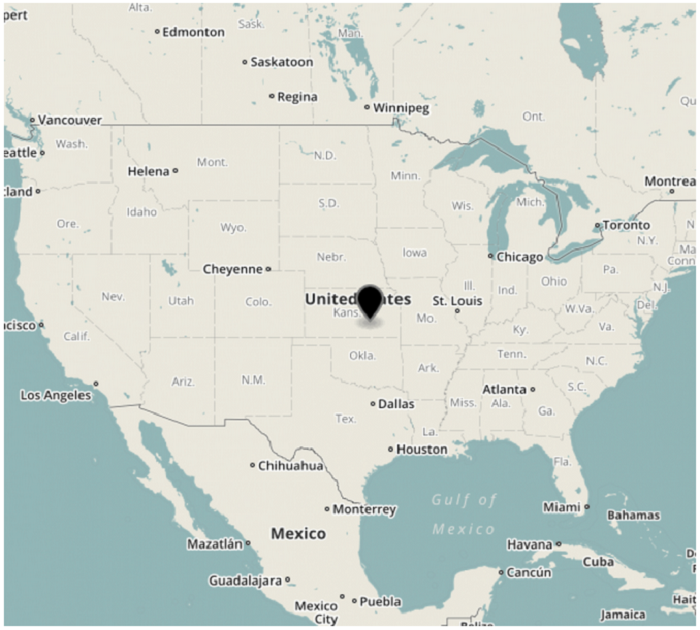MaxMind is an internet mapping firm that matches IP addresses to physical locations. The practice is still a work in progress, and is not at all a reliable means of location information – sometimes, it can identify individual houses, but in other instances, it can only go so far as to cite the country a device is in.
According to court documents filed by James and Theresa Arnold in a $75,000 case against MaxMind, the company registered their home as the default position of more than 600 million unidentifiable IP addresses. The result of this decision led to the Arnolds being falsely accused of committing numerous crimes on the property, both by those seeking personal justice as well as law enforcement officials. A disgruntled victim of an online hack left a toilet in the Arnolds home to demonstrate their frustration.
A disgruntled victim of an online hack left a toilet in the Arnolds home to demonstrate their frustration.
“The first week after the Arnolds moved in, two deputies from the Butler County Sheriff's Department came to the residence looking for a stolen truck. This scenario repeated itself countless times over the next five years,” per documents filed with a Kansas court.
Additionally, the Arnolds add that they were disturbed at all hours of the night by “local, state or federal officials looking for a runaway child or a missing person, or evidence of a computer fraud, or call of an attempted suicide”.
According to an earlier investigation in to the matter by website / TV network Fusion, the confusion was due to MaxMind having chosen the Arnold’s property as the default location for IP addresses in all instances that it could not precisely establish an IP address beyond it being in the USA.
And the reason why the Arnold’s house was specifically chosen is because it is near the geographical center of the country. Approximate location of the Arnold home.
Approximate location of the Arnold home.
For those unfamiliar with the purpose of IP addresses, it should be understood that most of the devices we use nowadays connect to a network by way of Internet protocol (IP). In order to do this, the device requires an IP address. That means everything from smartphones and tablets to laptops and computers, all have an IP address.
But that’s not all that the IP address does – its primary purpose is to allow these devices to interact with one another. Now, it should be noted that the IP address of one device is not necessarily known by other devices when connecting to the Web. That’s because the IP address displayed is the one provided by the router to which the device is connected to — it is this set of IP addresses that companies like MaxMind are interested in mapping.
There are a couple of scenarios as to how this IP address can be recognized – if you live by yourself with your own personal router, then the IP address is yours and yours alone. However, if you’re connected to a public router, like say, in a library or coffee shop, then the IP address is shared by many.
This is where things get a bit tricky – whole networks can now span across buildings, street blocks, and even cities (especially with the implementation of public WiFi). In these cases, it’s harder for digital mapping services like MaxMind to record the exact location of an IP address. Throw in the whole privacy movement, which has introduced free programs that mask IP addresses, and the mapping process is pretty close to impossible; hence, the need for a default location in these (600 million) instances.  A satellite view of the Arnolds home, which is located close to the center of the United States.
A satellite view of the Arnolds home, which is located close to the center of the United States.
The earliest case Mrs. Taylor can recall of a threat being made came in 2011 when she received a call from a business owner who blamed her for his customer’s email problems.
“The first call I got was from Connecticut,” Taylor told Fusion. “It was a man who was furious because his business internet was overwhelmed with emails. His customers couldn’t use their email. He said it was the fault of the address at the farm. That’s when I became aware that something was going on.”
This was only the beginning though — thereafter, the Arnolds received a steady stream of accusers visiting their home under the assumption that it was the location of the IP address tied to a degenerate activity to which the accuser was the victim (refer to the picture of the toilet in the driveway to understand how some went about exercising their personal form of justice).
Among the accusers were law enforcement officials, too.
“In 2013, the Butler County Sheriff Department ran a background check on the plaintiffs because of all the activity taking place at the residence,” the court documents read. It adds that the department opted for the check because it was receiving “weekly reports about fraud, scams, stolen Facebook accounts, missing person reports” and more, all linked to this one address.
“Threats began to be made against the plaintiffs by individuals who were convinced that the perpetrator of internet scamming lived at the residence. State investigators — convinced that the plaintiffs had been involved in an identity theft — came to the residence to take pictures of assets.
“The following events appeared to originate at the residence and brought trespassers and/or law enforcement to the plaintiffs' home at all hours of the night and day: stolen cars, fraud related to tax returns and bitcoin, stolen credit cards, suicide calls, private investigators, stolen social media accounts, fund raising events and numerous other events.”
In the court case, the Arnolds accuse MaxMind of “reckless and grossly negligent conduct”, which has resulted in “great emotional distress, fear for their safety, and humiliation”. As such, they’ve asked the Kansas court to award them $75,000 in damages.
While representatives from MaxMind have not commented on the case specifically, the company’s co-founder, Thomas Mather, explained the following to Fusion: “The default location in Kansas was chosen over ten years ago when the company was started. At that time, we picked a latitude and longitude that was in the center of the country, and it didn’t occur to us that people would use the database to attempt to locate people down to a household level.”
Mather goes on to conclude: “We have always advertised the database as determining the location down to a city or zip code level. To my knowledge, we have never claimed that our database could be used to locate a household.”
Whether this is another instance of a technology being rolled out sooner than it’s ready or instead a case of a company’s carelessness is up to the court to decide. Worth noting, though, is that MaxMind has since changed its default center points to be in the middle of bodies of water.
To learn more about this case, read the full story on Fusion.
Advertisement
Learn more about Electronic Products Magazine





